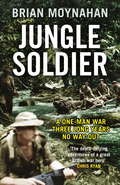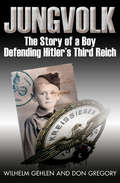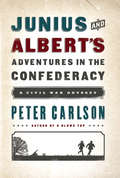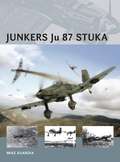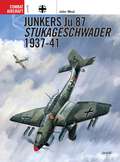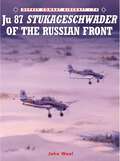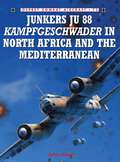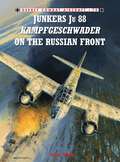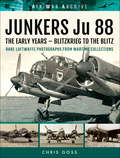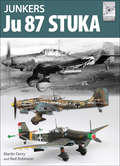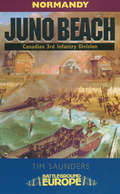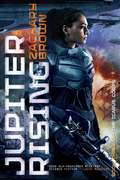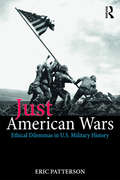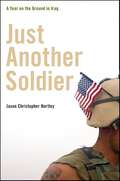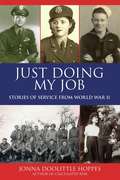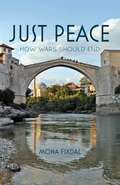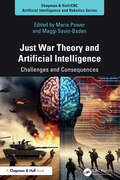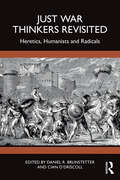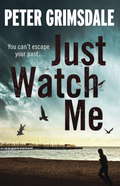- Table View
- List View
Jungle Soldier: The true story of Freddy Spencer Chapman
by Brian MoynahanArctic explorer, survival expert and naturalist Freddy Spencer Chapman was trapped behind enemy lines when the Japanese overran Malaya in 1942. His response was to begin a commando campaign of such lethal effectiveness that the Japanese deployed an entire regiment against him, hunting for him as they did for no other. He was wounded, and racked by tropical disease. His companions were killed, or captured and then beheaded. Cut off from friendly forces, his only shelter the deep jungle, Chapman held out for three years and five months. Jungle Soldier recounts the thrilling and unforgettable adventures of the north country orphan who survived against all odds to become a legend of guerrilla warfare.
Jungvolk: The Story of a Boy Defending Hitler's Third Reich
by Wilhelm Gehlen Don Gregory&“An extraordinary account of a young boy caught up in the middle of a war . . . frank and even funny at times . . . utterly absorbing&” (Books Monthly). This is the wartime memoir of a boy named Will, who happened to be the nephew of the head of Nazi Germany&’s intelligence agency. The author, only ten years old when the war began, became a helper at the local Luftwaffe flak battery, fetching ammunition. It was exciting work for Will, a member of the &“Jungvolk,&” and by the end of the war, he had become expert at judging attacks. As fighter raids increased in frequency, he noted that the pilots became less skilled. Gehlen&’s town was repeatedly bombed, and he often had to help with the wreckage or to pull survivors from basements. He witnessed more death than a child ever should; nevertheless, his flak battery continued firing until US tanks were almost on top of the position. In this book, Gehlen provides an intimate glimpse of the chaos, horror, and black humor of life just behind the front lines. As seen through the eyes of a child who was expert in aircraft identification and bomb weights, food-rationing and tank types, one encounters a view of life inside Hitler&’s wartime Reich that is both fascinating and rare. &“Although the memories Gehlen shares are narrow, and offer little insight into the Reich itself, they&’re remarkable for the child&’s perspective they bring to bear on a warring country&’s ferocious struggle.&” —Publishers Weekly &“A real gem, a quiet tour de force . . . Despite its serious subject matter the book reads as an adventure story from start to finish.&” —Military Modelling
Junius and Albert's Adventures in the Confederacy: A Civil War Odyssey
by Peter CarlsonJunius Browne and Albert Richardson covered the Civil War for the New York Tribune until Confederates captured them as they tried to sneak past Vicksburg on a hay barge. Shuffled from one Rebel prison to another, they escaped and trekked across the snow-covered Appalachians with the help of slaves and pro-Union bushwhackers. Their amazing, long-forgotten odyssey is one of the great escape stories in American history, packed with drama, courage, horrors and heroics, plus moments of antic comedy. On their long, strange adventure, Junius and Albert encountered an astonishing variety of American charactersuAbraham Lincoln and Ulysses S. Grant, Rebel con men and Union spies, a Confederate pirate-turned-playwright, a sadistic hangman nicknamed othe Anti-Christ, OCO a secret society called the Heroes of America, a Union guerrilla convinced that God protected him from Confederate bullets, and a mysterious teenage girl who rode to their rescue at just the right moment. Peter Carlson, author of the critically acclaimed "K Blows Top," has, in "Junius and AlbertOCOs Adventures in the Confederacy," written a gripping story about the lifesaving power of friendship and a surreal voyage through the bloody battlefields, dark prisons, and cold mountains of the Civil War.
Junkers Ju 87 Stuka
by Mike GuardiaIn the opening days of Nazi Germany's Blitzkrieg campaigns, few aircraft could invoke as much terror as the Junkers Ju 87. Nicknamed the "Stuka" (an abbreviation of Sturzkampfflugzeug - the German term for "dive-bomber"), the Ju 87 was perhaps the most feared tactical bomber of the ETO. With its fixed landing gear and inverted gull wings, the Stuka was easily one of the most recognizable aircraft of the Blitzkrieg era. Although a sturdy and reliable dive-bomber, the Stuka's effectiveness was largely psychological in nature. Its dive-activated air siren produced a dreadful wail - which could incite panic in even the most disciplined of enemy ground units. However, the Stuka's effectiveness waned during the later years of the war. Lightly armored and ill-suited for air combat maneuvering, the Stuka was easy prey for Allied fighters. This title follows the Ju 87 from its development and early deployment through its operational history in the skies over Europe.
Junkers Ju 87 Stukageschwader 1937-41
by Mike Chappell John WealThe Ju 87 Stuka was the most feared weapon in the German arsenal in the first year of World War II (1939-1945), the Luftwaffe using it to deadly effect during the Blitzkrieg between September 1939 and June 1940. Although vulnerable to the enemy fighters due to its moderate speed in level flight and general lack of manoeuvrability, the Ju 87 nevertheless soon came to symbolise the might of Nazi Germany as the mere handful of Stukageschwader supporting the Wehrmacht rampaging out of the Fatherland took a heavy toll of the Allied forces.
Junkers Ju 87 Stukageschwader of the Russian Front
by John WealThis final volume of the Osprey trilogy on the infamous Luftwaffe dive-bomber charts its fortunes in the toughest theater of all: the Eastern Front. The fearsome reputation that the Stuka had enjoyed in the opening months of World War II (1939-1945) was shattered over the English Channel in the summer of 1940 but was restored in the invasion of the Soviet Union. Against a demoralized enemy, the Ju 87 scored a string of spectacular successes, destroying infantry, artillery and armor alike and sinking numerous ships of the Soviet Baltic Fleet. In the far north one Stukagruppe concentrated on bombing the Arctic port of Murmansk and disrupting rail traffic down into the Russian hinterland. However, as the Soviet Union slowly gathered strength, the Stuka units found themselves outnumbered, outfought, and relegated to operating under cover of darkness. The days of the dive-bomber were finally over. The Schlacht, or ground-attack, aircraft now ruled the skies above the battlefields.
Junkers Ju 88 Kampfgeschwader in North Africa and the Mediterranean
by John WealThis volume follows the Luftwaffe's twin-engined Wunderbomber southwards to describe its deployment in North Africa and the Mediterranean Theater during World War II (1939-1945), from the Straits of Gibraltar in the west, via the beleaguered island of Malta, to the Aegean and the Suez Canal in the east. It is a story of two distinct parts - the initial lightning successes, and then the long, slow process of retreat and defeat. It began early in 1941 with the first sporadic air raids on Malta, followed in the spring by the campaign in the Balkans which resulted in the conquests of Yugoslavia, Greece and Crete. After supporting land operations in North Africa during the latter half of 1941, the Ju 88s resumed their assault on Malta. Such was their decline, however, that by the final month of the war there was just one machine left in the Mediterranean - an improved model Ju 188, which was used to drop Axis agents behind the Allied lines in Italy. Bringing the story to life are personal accounts of some of the more famous actions - the bombing of the evacuation shipping off the coast of Greece and the sinking of three Royal Navy destroyers south of Crete by the renowned 'Helbig Flyers' of LG 1, all illustrated with rare photographs and full color profiles.
Junkers Ju 88 Kampfgeschwader on the Russian Front
by John WealCompleting Osprey's triliogy on the Ju 88 Kampfgeschwader this new volume focuses on activities on the Eastern Front during World War II (1939-1945). Comprising the main punch of the Luftwaffe's bomber arm during the initial invasion of the Soviet Union, the Ju 88 participated in a number of early strategic bomber raids on Moscow before assuming responsibility for supporting the Wehrmacht's ground forces in the field. In this role, the Ju 88s attacked bridges, road and rail communications, and troop concentrations and gave rise to many individual incidents that contribute to a varied and interesting narrative. Along with this main narrative, the book also covers the role the Ju 88s played in attacking the artic convoys that were shipping allied war supplies to Russia, and the several variant models that were employed. The strangest of these was a Ju 88 packed with explosives and guided by a fighter clipped onto its back that was used as a giant bomb against the Russians as they were approaching Berlin late in the war.
Junkers Ju 88: Blitzkrieg to the Blitz (Air War Archive)
by Chris GossDesigned as a fast bomber that could out-run the fighters of the era, the twin-engine Junkers Ju 88 became one of the most versatile aircraft of the Second World War. Such was the success of the design that its production lines operated constantly from 1936 to 1945, with more than 16,000 examples being built in dozens of variants – more than any other twin-engine German aircraft of the period. From an early stage it was intended that it would be used as a conventional light bomber and as a dive-bomber. As such, it served in the invasion of Poland, the Norway campaign, the Blitzkrieg and the invasion of France and the Battle of Britain. It went on to operate in North Africa, formed a key part of the air assault in Operation Barbarossa, and was vital to the Luftwaffes defence of Germany in the face of the Allied bomber offensive. It was also adapted for use as a fighter, night fighter, torpedo bomber, reconnaissance aircraft and even as a Mistel flying-bomb. It was used effectively against both land targets and shipping. In this selection of unrivalled images collected over many years, and now part of Frontline's new War in the Air series, the operations of this famous aircraft are portrayed and brought to life.
Junkers Ju87 Stuka (FlightCraft)
by Neil Robinson Martin DerryThe Junkers Ju 87 Stuka (a contraction of the German word Sturzkampfflugzeug, ie dive bomber) was arguably the Luftwaffes most recognizable airplane, with its inverted gull wings and fixed spatted undercarriage.Designed by Hermann Pohlmann as a dedicated dive bomber and ground-attack aircraft, the prototype first flew in 1935, and made its combat debut in 1937 with the Luftwaffe's Condor Legion during the Spanish Civil War. After several design changes in the light of operational experiences, the Stuka went on to serve the Luftwaffe and Axis forces, from the invasion of Poland in 1939, through the Battles of France and Britain in 1940, over the North African desert and the across Mediterranean, the invasion of Russia and the subsequent bitter fighting in that vast area, and following several more design changes and upgrades, continued to serve through to the end of World War Two.This latest addition to the growing Flight Craft range, follows the previous well established format, in that it is split in to three main sections. The first section, after offering a concise design and development history, continues with coverage of the various subtypes, from Anton to Gustav and their operational use from the Spanish Civil War to the end of World War Two.This is followed by a 16-page full color illustration section featuring detailed profiles and 2-views of the color schemes and markings carried by the type in Luftwaffe and Axis service. The final section lists as many of the injection-moulded plastic model kits produced of the Junkers Ju 87 in all the major scales that the authors could find details of, including the brand new Airfix 1/72 and 1/48 scale kits which were released while this book was being written, with photos of many finished models made by some of the worlds best modelers.As with all the other books in the Flight Craft range, whilst published primarily with the scale aircraft modeler in mind, it is hoped that those readers who might perhaps describe themselves as 'occasional' modelers, or even simply aviation enthusiasts, may also find that this colourful and informative work offers something to provoke their interests too.
Juno Beach: Canadian 3rd Infantry Division–July 1944 (Battleground Europe)
by Tim SaundersBy June 1944, Juno Beach was a key part of Hitler's vaunted Atlantic Wall, with no less than four major strong points along its length. German pillboxes were sited to sweep the beaches with machine gun fire and were surrounded by belts of barbed wire and mines. Leading the attack were the 3rd Canadian Division, supported by the specialist assault tanks of the 79th Armoured Division (Hobart's 'Funnies'). Despite careful planning, poor D-Day weather led to a piecemeal landing and heroic individual battles in the streets of the seaside towns.
Jupiter Rising: The Darkside War; Titan's Fall; Jupiter Rising (The Icarus Corps #3)
by Zachary BrownAn omnibus edition of The Icarus Corps trilogy: The Darkside War, Titan’s Fall, and the newest novel, Jupiter Rising, which details our sudden involvement in a galactic war that wants to use humanity as cannon fodder in a galactic war between two opposing factions where the last battles take place in our solar system.Nebula and World Fantasy Award–nominated author Zachary Brown created what Locus magazine raves as “good old fashioned military science fiction” in the Icarus Corps trilogy. The always outgunned and under-equipped human soldiers known as the Colonial Protection Forces battle across the moon and the alien desert landscapes of Titan all to make one desperate attack at Jupiter to hold the invading Conglomeration forces at bay, only to have a greater threat revealed as we find out why the Conglomeration—Accordance War has been raging across the galaxy.
Jus Post Bellum and Transitional Justice
by Larry May Elizabeth EdenbergThis collection of essays brings together jus post bellum and transitional justice theorists to explore the legal and moral questions that arise at the end of war and in the transition to less oppressive regimes. Transitional justice and jus post bellum share in common many concepts that will be explored in this volume. In both transitional justice and jus post bellum, retribution is crucial. In some contexts criminal trials will need to be held, and in others truth commissions and other hybrid trials will be considered more appropriate means for securing some form of retribution. But there is a difference between how jus post bellum is conceptualized, where the key is securing peace, and transitional justice, where the key is often greater democratization. This collection of essays highlights both the overlap and the differences between these emerging bodies of scholarship and incipient law.
Just American Wars: Ethical Dilemmas in U.S. Military History (War, Conflict and Ethics)
by Eric PattersonThis book examines the moral choices faced by U.S. political and military leaders in deciding when and how to employ force, from the American Revolution to the present day. Specifically, the book looks at discrete ethical dilemmas in various American conflicts from a just war perspective. For example, was the casus belli of the American Revolution just, and more specifically, was the Continental Congress a "legitimate" political authority? Was it just for Truman to drop the atomic bomb on Japan? How much of a role did the egos of Kennedy, Johnson and Nixon play in prolonging the Vietnam War? Often there are trade-offs that civilian and military leaders must take into account, such as General Scott’s 1847 decision to bombard the city of Veracruz in order to quickly move his troops off the malarial Mexican coast. The book also considers the moral significance and policy practicalities of different motives and courses of action. The case studies provided highlight the nuances and even limits of just war principles, such as just cause, right intention, legitimate authority, last resort, likelihood of success, discrimination, and proportionality, and principles for ending war such as order, justice, and conciliation. This book will be of interest for students of just war theory, ethics, philosophy, American history and military history more generally.
Just Another Soldier: A Year on the Ground in Iraq
by Jason Christopher HartleyThis is not your father's warThis is Iraq, where a soldier's first duty is reinforcing his Humvee with sheet metal and sand bags. Or, in the absence of plumbing, burning barrels of human waste. Where any dead dog on the side of the road might be concealing an insurgent's bomb and anyone could be the enemy.At age 17, Jason Christopher Hartley joined the Army National Guard. Thirteen years later, he is called to active duty, to serve in Iraq. Sent to a town called Ad Dujayl, made notorious by Saddam Hussein's 1982 massacre, Hartley is thrust into the center of America's war against terrorism. This is his story."If you are distrustful of the media and want to know exactly what's going on in Iraq, you'll have to pray for divine enlightenment, because only god knows what the hell is going on over here. However, if you want to know how it feels to be a soldier in Iraq, to hear something honest and raw, that I can help you with."Sometimes profane, often poignant, and always nakedly candid, Just Another Soldier takes the reader past the images seen on CNN and the nightly news, into the day to day reality of life on the ground as an infantryman, attached to the 1st Division, in the first war of the 21st century. From the adrenaline rush of storming a suspected insurgent's house, to the sheer boredom of down time on the base, to the horror of dead civilians, Hartley examines his role as a man, as a soldier and as an American on foreign soil. His quest to discover the balance between his compassionate side and his baser instincts, results in a searing portrait of today's Army and a remarkable personal narrative written in a fresh and exciting new voice. Just Another Soldier is more than a war story; it delivers an intimate look at a generation of young men and women on the front lines of American policy.Whether you're for or against the war in Iraq, this is essential reading.
Just Another War
by Gelder MeyerJust Another War, by Gelder Meyer, is a tale of good overcoming evil. The characters meet each other, if seemingly accidentally, just before the time of the First Crusade. The characters have the ability to communicate with each other via ESP and by combining their talents, they overcome the evil force. When they meet again, it is in their next incarnation. Their ESP ability is honed to the degree that they could communicate with others of their choice and they are now in the very early years of the twenty-first century. The world is on the threshold of utter destruction, whereupon these three are able to help their group to be among the powers to start a new world. GELDER MEYER was born in the Dutch Indies. At three years old, he was a Japanese prisoner of war with his mother, his brothers, and his sister. He grew up in Indonesia, left when he was eleven years old, and then went to Holland. At eighteen, he went to live and work in Colombia, South America for a few years, before returning to live in Holland, where he and his wife have two grown sons and five grandchildren.
Just Doing My Job: Stories of Service from World War II
by Jonna Doolittle HoppesPreserving the personal histories of civilians and soldiers who united to defend America during the Second World War, this oral history tells the stories of ordinary citizens who left jobs and families behind to contribute to the war effort. Chronicling the sacrifices made by otherwise average people, this keepsake features profiles and interviews with the men and women who responded to the call to action by putting their lives on hold to fight for their country at home and abroad. From soldiers and spies to factory workers and nurses, the heroes profiled in this history include Dick Hamada, a Japanese-American who became a spy with the Office of Strategic Services; Edith McClure, an army nurse stationed in England; Bobby Hite, one of the famed Doolittle Raiders, who was captured by the Japanese and endured years of torture and solitary confinement; and pilot Bob Hoover, who was shot down over enemy territory and imprisoned but managed to escape by stealing a German plane.
Just Her Luck
by Kelli EvansTake one man. Add in annoying charm and sexy good looks. Toss back a few too many drinks and Ronnie may find her moral compass spinning out of control.Ronnie Hilt is the ideal business woman and golden child--successful, dedicated, and an absolute perfectionist. Joe Aarons can ruffle her cool like no one can, but due to a heartache looming in her past Ronnie is looking for stability not a tall, virile, dangerous sheriff.Officer Joe Aarons has been after Ronnie since the day they met. He may come off as the carefree, smirky, risk-taker that Ronnie thinks he is, but deep down he's looking for the permanence and family he's never truly had. While there are many other women in town who wouldn't be opposed to settling down with the town's hot cop, he can't ignore the chemistry sparking with Ronnie.A drunken wild night allows Ronnie to let her hair down and with it her walls and inhibitions. In the morning Joe is hoping for more, while Ronnie is trying to pretend it never happened. It's just her luck that one home pregnancy test several weeks later proves that she can't. With a baby on the way, Ronnie tells Joe she wants to marry him for the sake of appearances. Joe's left trying to decide how far Ronnie will go to keep up her good girl reputation, and to what lengths he'll go to have her and the family he's always wanted.
Just Once: A Novel
by Karen KingsburyThe #1 New York Times bestselling author &“known for her deeply heartfelt novels&” (Woman&’s World) writes a sweeping World War II love story about a young woman torn between two brothers.In 1941, beautiful Irvel Holland is too focused on her secret to take much notice of the war raging overseas. She&’s dating Sam but in love with his younger brother, Hank—her longtime best friend—and Irvel has no idea how to break the news. Then the unthinkable happens—Pearl Harbor is attacked. With their lives turned upside down overnight, Sam is drafted and convinces Hank to remain in Indiana, where he and Irvel take up the battle on the home front. While Sam fights in Europe, an undeniable chemistry builds between Irvel and Hank but neither would dare cross that line. Then, two military leaders pay Irvel a visit at the classroom where she teaches. The men have plans for her, a proposition to join a new spy network. One catch: She can tell no one. With Irvel caught between two brothers thousands of miles apart, can love find a way, even from the ashes of the greatest heartbreak?
Just Peace
by Mona FixdalDrawing on many of the wars and peaces of recent decades, this book offers a persuasive new perspective on postwar justice. In her analysis wars of succession, wars for territory, and the political institutions that precede and follow wars, Fixdal explores the outer limits of the idea that it is worth paying almost any price for peace.
Just War Theory and Artificial Intelligence: Challenges and Consequences (Chapman & Hall/CRC Artificial Intelligence and Robotics Series)
by Maggi Savin-Baden Maria PowerTwo of the most crucial issues facing humanity in the contemporary world are artificial intelligence and armed conflict. This book tackles them both, bringing them into conversation with one another and creating an understanding of their relationship. New developments in technology, especially within weapons systems, have challenged our understandings of just war theory, thus changing the nature of the questions to be asked of and by those engaged in conflict. Covering topics such as drone warfare and the use of wargaming by combatants, this collection seeks to answer those questions with essays from leading experts in the field. It will be a valuable resource for those interested in both the development of artificial intelligence generally and warfare specifically.
Just War Thinkers Revisited: Heretics, Humanists and Radicals (War, Conflict and Ethics)
by Daniel R. Brunstetter Cian O’DriscollThis book comprises essays that focus on a range of thinkers who challenge the boundaries of the just war tradition.The ethics of war scholarship has become a rigid and highly disciplined activity, closely associated with a very particular canon of thinkers. This volume moves beyond this by presenting thinkers not typically regarded as part of that canon but who have interesting and potentially important things to say about the ethics of war. The book presents 20 profile essays on an eclectic cast of heretics, humanists, and radicals, from ancient Greece to the twenty-first century, who lived through and theorized about violence. The book asks how ethics of war scholars might benefit from engaging with them. Some of these thinkers engage directly with—to augment or criticize—the just war tradition, while others contribute to military thinking across the ages, pushing the boundaries of what was acceptable in war. Many proffer alternative moral frameworks regarding the legitimacy of political violence. The present volume thus invites scholars to reconsider the ethics of war in a way that challenges the standard delineation between just war theory, realism, and pacifism and to reflect on how those positions might inform our own approach to these matters.This book will be of much interest to students of just war theory, ethics of war, war studies, and International Relations.
Just Warriors, Inc: The Ethics Of Privatized Force (Think Now Series)
by Jeremy Stangroom James Garvey Deane-Peter BakerThe presence of contractors on today's battlefields is without question one of the most significant developments in modern warfare. While many contractors perform relatively benign tasks on behalf of the military, controversy rages around those contractors who offer services that involve the use of armed force. <P><P> The rise of the private military industry raises some difficult issues. For example, Jeremy Scahill, one of the industry's most vociferous critics, questions whether the outsourcing of military force is not ‘a subversion of the very existence of the nation-state and of principles of sovereignty'. These questions are at essence philosophical challenges to the existence of the private military industry. <P><P>In Just Warriors, Inc., philosopher and ethicist Deane-Peter Baker argues that, contrary to popular assumptions, a compelling moral and philosophical case can be made in favour of the ongoing utilization of the services that these ‘private warriors' offer. The book is a must-read for anyone interested in moving beyond the hyperbole and exploring in depth the real questions that should be asked about the privatisation of military force.
Just Watch Me
by Peter GrimsdaleYou can't escape your past... When an ex-sniper loses his family, he finds himself in the cross-hairs of a massive conspiracy. A gripping thriller from the author of PERFECT NIGHT.When Dan Carter is forced to miss a much-needed family holiday, his wife and children go ahead without him. Within hours, their plane has disappeared over the Atlantic and his life is changed for ever.Stricken by grief, Dan goes in search of answers. Was this simply a terrible tragedy or something more sinister - something personal? For the Carters are not a normal family. Perhaps they never were...Shadows from the past gather around him as Dan edges closer to the truth, and a chilling conspiracy threatens to engulf him. But in a world where nothing is as it seems, who can he really trust...?
Just a Little Bit Pregnant (Just a Little Bit #1)
by Eileen Wilks"I'M WHAT?!"The doctor had confirmed it-Jacy James was two months pregnant. Her torrid, twelve-hour affair with Tom Rasmussin had apparently left her more than just satisfied. Trouble was, the father-to-be had run off while the tousled sheets were still hot. Now Jacy had to tell him the news....Detective Tom Rasmussin hadn't been able to get Jacy or that searing night of passion out of his mind. So when he learned he was going to be a daddy, well, marriage seemed the right thing to do. But the proud woman turned him down flat. And now this determined bachelor had to convince Jacy that one night of passion could mean a lifetime of happiness....
